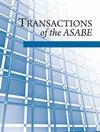基于遥感技术的树种表型结构特征研究
IF 1.4
4区 农林科学
Q3 AGRICULTURAL ENGINEERING
引用次数: 7
摘要
highlighttree树冠建筑的特点与它的生产力和管理有关。了解这些性状对精准农业和表型组学应用都很重要。遥感平台(卫星、无人机等)和多种方法(SfM、LiDAR)已被用于评估这些特征。树冠的三维重建可以测量树高、树冠面积和树冠体积。树冠建筑与光的利用效率和生产力有关。鉴于果园果树系统的现代培训系统,修改树木结构对于更容易管理作物(例如,修剪,间伐,化学施用,收获等)同时保持果实的质量和数量变得重要。同样,在森林环境中,建筑可以影响生态系统中树种之间的竞争和平衡。本文回顾了与用于评估建筑特征的传感方法和影响评估过程的因素相关的文献。与运动分析结构相结合的数字图像以及地面和空中光探测和测距(LiDAR)系统已被广泛使用。此外,还探索了卫星图像和其他技术。这里总结了这些测量方法的一些主要发现和一些关键考虑。关键词:冠层体积,激光雷达系统,运动结构,树高,无人机本文章由计算机程序翻译,如有差异,请以英文原文为准。
Phenotyping Architecture Traits of Tree Species Using Remote Sensing Techniques
HighlightsTree canopy architecture traits are associated with its productivity and management.Understanding these traits is important for both precision agriculture and phenomics applications.Remote sensing platforms (satellite, UAV, etc.) and multiple approaches (SfM, LiDAR) have been used to assess these traits.3D reconstruction of tree canopies allows the measurement of tree height, crown area, and canopy volume.Abstract. Tree canopy architecture is associated with light use efficiency and thus productivity. Given the modern training systems in orchard tree fruit systems, modification of tree architecture is becoming important for easier management of crops (e.g., pruning, thinning, chemical application, harvesting, etc.) while maintaining fruit quality and quantity. Similarly, in forest environments, architecture can influence the competitiveness and balance between tree species in the ecosystem. This article reviews the literature related to sensing approaches used for assessing architecture traits and the factors that influence such evaluation processes. Digital imagery integrated with structure from motion analysis and both terrestrial and aerial light detection and ranging (LiDAR) systems have been commonly used. In addition, satellite imagery and other techniques have been explored. Some of the major findings and some critical considerations for such measurement methods are summarized here. Keywords: Canopy volume, LiDAR system, Structure from motion, Tree height, UAV.
求助全文
通过发布文献求助,成功后即可免费获取论文全文。
去求助
来源期刊

Transactions of the ASABE
AGRICULTURAL ENGINEERING-
CiteScore
2.30
自引率
0.00%
发文量
0
审稿时长
6 months
期刊介绍:
This peer-reviewed journal publishes research that advances the engineering of agricultural, food, and biological systems. Submissions must include original data, analysis or design, or synthesis of existing information; research information for the improvement of education, design, construction, or manufacturing practice; or significant and convincing evidence that confirms and strengthens the findings of others or that revises ideas or challenges accepted theory.
 求助内容:
求助内容: 应助结果提醒方式:
应助结果提醒方式:


